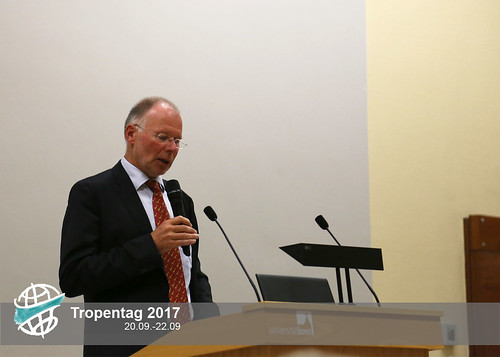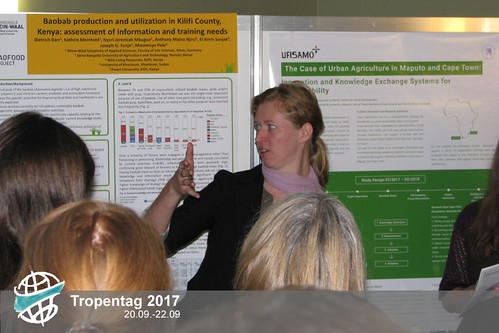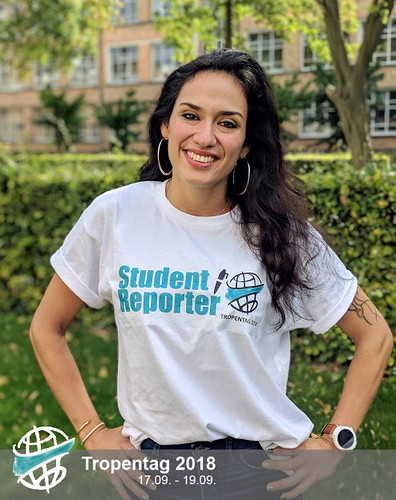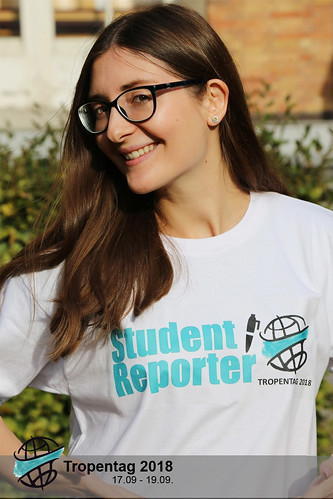Blogs

The Aerialist
Sun, 09/16/2018 - 14:19 — zachmann
Ritti is a PhD student in Social Anthropology at the University of Edinburgh, scholar for the Carnegie Trust, and a trained Media Designer for Picture and Sound. Her PhD research focus is on Lyme disease in Scotland, but she is very passionate about food security and ethnobotany so she realised Tropentag 2018 was the perfect opportunity to expand beyond her research, discover the important research first-hand from the scientists, and explore her extracurricular interests to strengthen her position as a researcher. In the Student Reporter team, Ritti is in charge of social media (Twitter and Instagram), blogging and photography. By day, she is an anthropologist, by night an aerialist!
Gabriel, the explorer
Sun, 09/16/2018 - 14:02 — degodoyGabriel is an Agricultural Engineer from Brazil that just arrived in Belgium to start a MSc. Program in Nutrition and Rural Development at the University of Ghent. In the past years, he had some experiences with Sustainable Agriculture that significantly changed his way of understanding food production and the use of natural resources. He is looking forward to enjoy this opportunity of studying in Europe and learn about cultural and technical aspects of food production and consumption in a different continent. He is really excited to work as a Student Reporter at Tropentag as he believes this event covers a lot of the needs for enhancing agricultural production around the world, and it will be a great start for his young career abroad.

"They call me Hermione Granger"
Sun, 09/16/2018 - 13:57 — zachmann
Cristina, from Moldova, is a PhD student in Sustainable Rural Development in the Tropics and Subtropics at the University of Life Sciences in Prague, Czech Republic. She is currently researching the lack of young labour in agriculture in the Ukraine. In the Czech Republic, she is a voting member for GREENPEACE and a YPARD country representative for Moldova. Cristina believes that attending Tropentag as a Student Reporter can give her a valuable experience and she can give an excellent feedback of her work and involvement. Cristina is in charge of taking interviews in the Student Reporter team.

“Smallscale Organic Agriculture is a Niche”
Mon, 10/02/2017 - 16:17 — marlemke“Small-scale organic agriculture is a niche” said Hans-Joachim Preuß, the managing director of GIZ, the largest development aid agency in Germany. Apparently, the future of development is large-scale industrial agriculture and big investment, according to the agenda of GIZ. “Smallscale organic agriculture won’t save the world”, said Hans Braun, director of the CGIAR Research Program on Wheat at CIMMYT, a research and training institution focused on wheat and maize. I wondered, what happened to sustainable agriculture?

The excitement and expectations of the participants of Tropentag about this year’s theme “Future Agriculture: Social-ecological transitions and bio-cultural shifts” didn't flag and were mostly met throughout the week, at least until the last two keynote speakers. Braun suggested further intensification of grain cultivation, as well as greater collaboration with the GIZ. Braun’s statements were reinforced by Preuß, who said organic products were to “only" address a “niche market”.
Vétérinaires Sans Frontières (Germany)
Wed, 09/27/2017 - 12:00 — TTVétérinaires Sans Frontières is an NGO that operates in East Africa. They support pastoral communities through various projects, such as training animal health workers, who travel through local communities helping to both detect common diseases, and vaccinate against them. Another example is improving food hygiene, by providing aluminum cans to store milk. For more, go to their website
The Green Talents Award
Mon, 09/25/2017 - 18:33 — TTThe German Federal Ministry of Education and Research (BMBF) hosts the prestigious ”Green Talents – International Forum for High Potentials in Sustainable Development” to promote the international exchange of innovative green ideas. The winners come from numerous countries and scientific disciplines and are recognised for their outstanding achievements in making our societies more sustainable.
According to project coordinator Julia Kirschner, winning the Green Talents Award means you are invited with the other 24 recipients to Germany to attend the Green Talents Science Forum. You do not only get a chance to travel around Germany, but the chance to visit three experts of your choice. A year later you can arrange to have a research stay for three months at the institution of your choice.
A recipient of the award in 2016, Hèou Maléki Badjana from Togo shares his thoughts and experiences in the video below.
If you are interested in the Green Talents Competition 2018 please register for their Competition Alert and you will be informed as soon as the next submission period starts.
.First Day Poster Sessions
Mon, 09/25/2017 - 17:22 — TTA guided tour through some of the poster presentations on the first day of Tropentag 2017.

Give Farmers their Agency Back!
Mon, 09/25/2017 - 00:12 — marlemkeThe answer is: centralized breeding. Unfortunately, farmers are left out of the selection, development, and maintenance of crop traits. Even if they are the producers of our local food, and should be the protagonist.
The poster session on “Knowledge Systems” focused on educational and operative strategies with the ultimate goal of bringing food sovereignty to indigenous communities. Participatory breeding is an example of one that could strengthen local communities and provide independence from big seed and fertilizer companies.
Wouldn't that be great? This would not only give small farmers more freedom, but would also banish GMOs from their plates. Two birds with one stone.








